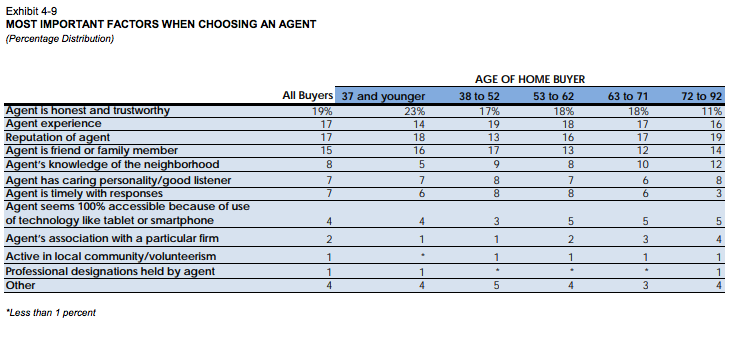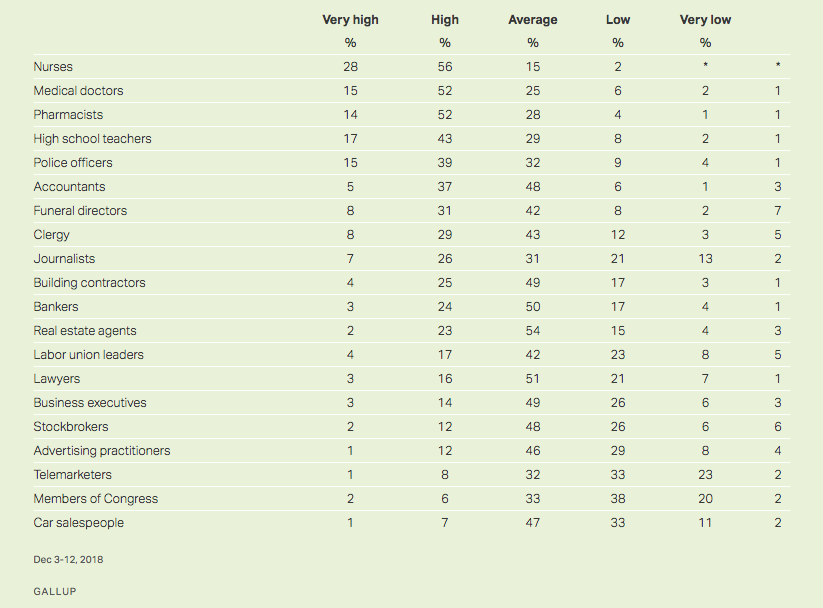“A salesperson’s ethics and values contribute more to sales success than do techniques or strategies.” – Ron Willingham, Integrity Selling
We all want to believe it’s our skill that gets us the job, but when it comes to real estate, often the numbers tell a different story. According to the 2018 National Association of REALTORS® Home Buyer and Seller Generational Trends report, the most important factor for all age groups, when choosing an agent, was honesty and trustworthiness.
In a world where Realtors are ranked in the middle of the Gallup poll of various professions based on their ethics and honesty (just a bit above lawyers), we still have a long way to go to improve the public’s perception of the industry.
It’s probably fair to say that most Realtors would like to be known for their honest business practices. Let’s look at some of the most common and tangible ways Agents can avoid unethical behaviors.
The Code of Ethics calls us to paint a true picture in our advertising. One of the quickest ways to get ourselves into trouble with this one is by using photography that has been photoshopped or altered. It’s important to ensure that all of your photos accurately represent the condition of the property. These days it’s too easy to apply a filter or use a wide angle lens to make those shots really pop. Just be sure that you aren’t producing a misleading result.
This doesn’t just relate to photos. Another common error is copying data from a previous listing without verifying the information or without permission. Sharing floor plans or copying room dimensions without verification or permission is a big no-no.
There are several articles in the Code of Ethics that pertain to disclosure, but foremost is the call to avoid exaggeration, misrepresentation, or concealment of pertinent facts relating to the property or transaction. It’s important to understand what you have to disclose, what you should disclose, and what you may not disclose. (When in doubt, ask your broker.)
These days, it seems that every business is tried in the court of public opinion. Anyone we interact with has the ability to voice their thoughts on our business or service on any number of social media sites, potentially reaching millions of others. How you address and respond to complaints often gets more attention than the complaint itself. Having a protocol for responses is key, and even more important, never leaving a complaint unaddressed.
It’s up to you to be aware of where the public is discussing you and your business, and be prepared to respond respectfully to questions and complaints. A helpful hint – use Google Alerts. This is a free tool that lets you receive notifications when you or your business is mentioned online.
As professionals, we are charged with treating all of our clients and customers fairly. Discrimination is not only unethical, it’s illegal. This is an area that often lands Realtors in hot water. One way to avoid this is to always get a second set of eyes on your written copy and marketing materials before they are distributed. It never hurts to have someone double check, just in case.
Wouldn’t it be amazing if life came with a ‘common sense’ clause? It is our duty to protect our clients and get them the very best result possible. It’s also our duty to represent our industry and cooperate with other Realtors. Sometimes it is as simple as reminding ourselves – if we don’t know, ask. Very often we find ourselves in trouble because we refused to ask for help. If you are unsure – ask. It’s the most basic of common sense rules.
The National Association of REALTORS® Code of Ethics and Standard of Practice sums up all 17 Articles by quoting the Golden Rule: Whatsoever ye would that others should do to you, do ye even so to them. If we all endeavor to follow this rule, we are far more likely to be known as both honest and trustworthy to our clients and reflect well on the industry.








